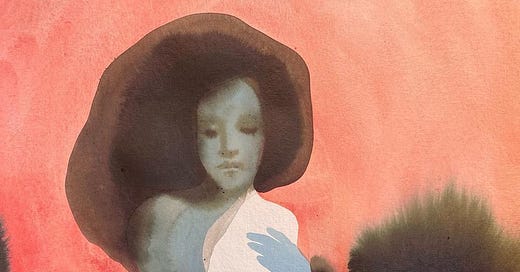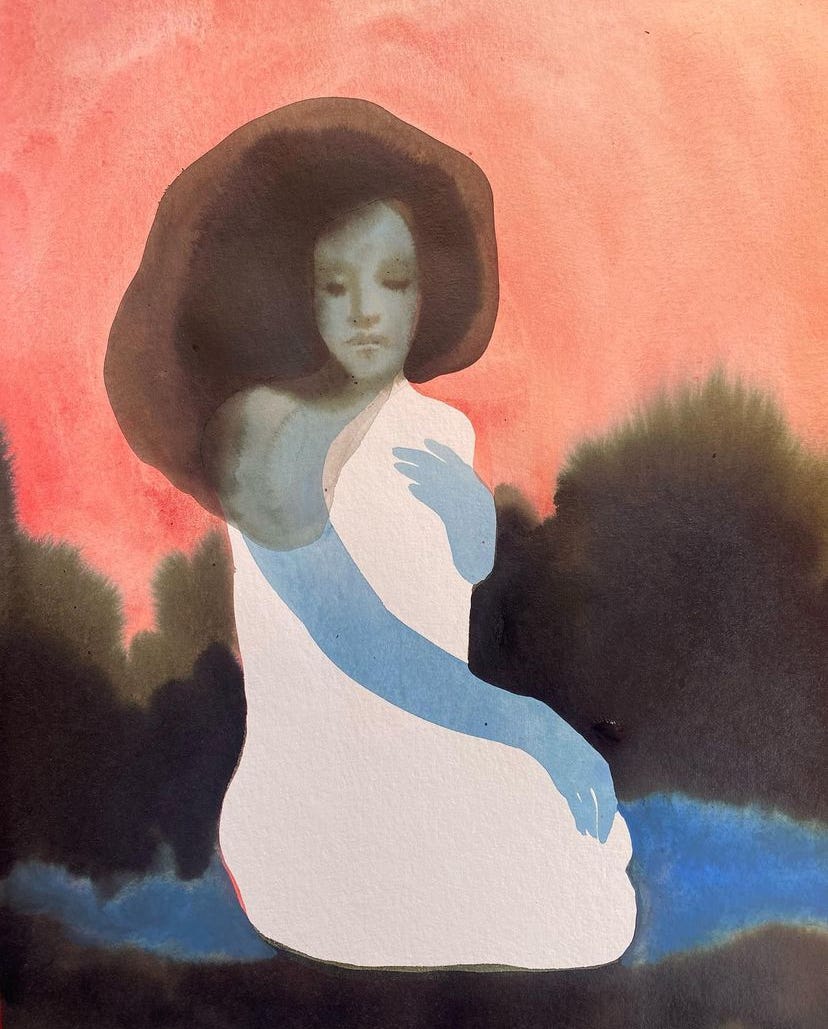I saw a dog die on Saturday. I had just parked in front of the studio where I facilitated a series of workshops for women who have experienced breast cancer and was arriving for our last meeting. As soon as I got out of the car, I saw the little dog there, in the middle of Crenshaw. The cars were coming, and I called out to him, trying to draw him toward me, but he ran straight into traffic. One car swerved, two, three, until the fourth car, coming fast, hit him.
Immediately, I started crying. My body felt like limp noodles, my chest tightened, sinking into my stomach. I felt such a deep sadness that I called out to God, a habit I carry from my Brazilian christian upbringing for moments of helplessness. For a few minutes, I stood there, looking at the little dog, now farther away from me, lying on the asphalt. I decided that I would pick him up and move him to another place, so I grabbed a towel from the car and went to meet him. I crossed the street, and he was no longer there; he was on the mediam strip, accompanied by a man who had also just witnessed the accident and, like me, felt the need to move him out of the street.
I cried, and the man did too. Looking at that tiny little body, which just moments before had been running around and now lay there without a pulse, I felt the inescapable touch of death taking life away like that, in a single, rapid second.
I thanked the man who had taken him out of the street. He nodded and, still tearful, went on his way. With my hands over his collapsed little body, I said a little prayer for him to go in peace and left him there, unsure if I should take him with me, but knowing I needed to go and honor my commitment to the women waiting for me at the studio.
I walked in, organized my things, and went to use the bathroom. There, sitting with my feelings, I caught myself feeling grateful for my ability to feel. I felt a deep sadness, shock, mourning for that little creature I couldn’t save. A bitterness in the pit of my stomach. But, along with it, I also sensed a huge relief. “How good it is that I am able to feel. How good it is that this touched me, that I’m not numbed.”
I left the bathroom, sat in my chair in the circle with the other women who looked at me expectantly, waiting for our gathering to begin. I told them what I had witnessed just a few minutes before and how it made me feel. And I shared that I was happy for feeling so deeply.
Yes, I felt happy for feeling the sadness of seeing that little dog die.
You see, in a culture where it’s considered normal to medicate any discomfort—whether with medication, with marijuana, with alcohol, with food, with sex, with shopping, with Instagram—realizing that I am so tender and full of feelings about that situation of death made me feel more alive.
I named my pain, was embraced by the women, and with that pain allowed in the space, I was able to do my work with honesty, without needing to pretend that I wasn’t feeling everything I was feeling. And, in this movement, I offered them an even deeper permission to allow the full variety of emotions they were carrying to be present.
It was the most beautiful, deepest, and most transformative group session I have ever facilitated.
When we learn to run away from uncomfortable feelings, to numb them, we don’t get good at not feeling discomfort; we get good at not feeling. We cannot numb selectively—if we stop feeling the unpleasant, we also lose the ability to feel what brings us comfort and pleasure.
During the workshop, I felt even more intensely and fully the feelings of gratitude, joy, empathy, and love. The pain I felt from seeing the little dog die didn’t take away my ability to feel the pleasure of what I was doing there, with those amazing women who trusted me, themselves, and each other to go deep into their own feelings. On the contrary, that pain put me in direct contact with my capacity to feel a lot.
I felt full, whole, taken by a sense of life that I am only able to experience because I also allow myself to feel the profound sensation of helplessness in the face of death.
Accepting pain gives us more space for love.
português
Uma lição inesperada sobre sentir
Eu vi um cachorro morrer no sábado. Tinha acabado de estacionar em frente ao estúdio onde facilitei uma série de workshops para mulheres que passaram pelo câncer de mama e estava chegando para o nosso último encontro. Assim que desci do carro, vi o cachorrinho ali, no meio da Crenshaw, uma avenida bem movimentada aqui em Los Angeles. Os carros vinham, e eu o chamava, tentando atraí-lo para mim, mas ele correu em direção ao trânsito. Um carro desviou, dois, três, até que o quarto carro, vindo bem rápido, o atropelou.
Imediatamente, comecei a chorar. Meu corpo amoleceu, meu peito apertou, afundando em direção ao estômago. Senti uma tristeza tão grande que chamei por Deus, um costume que carrego da minha cultura brasileira cristã em momentos de desamparo. Por alguns minutos, fiquei ali, olhando o cachorrinho que agora estava mais longe de mim, deitado no asfalto. Decidi que iria pegá-lo, movê-lo para outro lugar, então peguei uma toalha no carro e fui ao seu encontro. Atravessei a rua e ele já não estava mais lá; estava no meio-fio, acompanhado de um homem que também tinha acabado de testemunhar o acidente e, como eu, sentiu que precisava tirá-lo dali.
Eu chorava, e o homem também. Olhando aquele corpinho tão pequeno, que há poucos momentos estava correndo pela rua e agora estava ali, sem pulso, senti o inexorável toque da morte levando embora a vida assim, em um rápido segundo.
Agradeci ao homem que o tirou do meio da rua. Ele fez que sim com a cabeça e, ainda choroso, foi embora. Com as mãos sobre seu corpinho colapsado, fiz uma pequena oração para que ele fosse em paz e deixei-o ali, sem saber se deveria levá-lo comigo, mas consciente de que precisava ir e honrar meu compromisso com as mulheres me esperando no estúdio.
Entrei, organizei as coisas, e fui fazer xixi. Ali, no banheiro, sentada com os meus sentimentos, me peguei sentindo gratidão pelo meu sentir. Eu sentia uma tristeza profunda, choque, luto por aquele bichinho que eu não consegui salvar. Uma sensação de amargor no estômago. Mas, junto com ela, percebi também um alívio enorme. “Que bom que sou capaz de sentir. Que bom que isso me tocou, que não estou anestesiada”.
Saí do banheiro, sentei na minha cadeira no círculo com as outras mulheres que me olhavam com expectativa para o nosso encontro. Contei a elas o que havia presenciado minutos atrás e como aquilo me fazia sentir. E compartilhei que estava feliz por sentir tanto.
Sim, eu me senti feliz por sentir a tristeza de ver aquele cachorrinho morrer.
Veja, numa cultura que considera normal medicar todo e qualquer desconforto—com alopatia, com maconha, com álcool, com comida, com sexo, com compras, com Instagram—, perceber-me tão tenra e cheia de sentimentos sobre aquela situação de morte me fez sentir mais viva.
Nomeei minha dor, fui acolhida pelas mulheres, e, com a dor permitida no espaço, pude fazer meu trabalho com honestidade, sem precisar fingir que não estava sentindo tudo o que sentia. E, nesse movimento, trouxe ao espaço uma permissão ainda mais profunda para que cada uma delas também deixasse estar ali toda a variedade de emoções que traziam consigo.
Foi a sessão em grupo mais linda, mais profunda, mais transformadora que já facilitei.
Quando a gente aprende a fugir de sentimentos desconfortáveis, a anestesiá-los, ficamos ótimos não em deixar de sentir o desconforto, mas em deixar de sentir. Não podemos anestesiar seletivamente—se deixamos de sentir o desagradável, desaprendemos também a sentir o que nos gera conforto e prazer.
Durante o workshop, senti de uma forma ainda mais profunda e gostosa os sentimentos de gratidão, alegria, empatia e amor. A dor que senti vendo o cachorrinho morrer não me tirou a possibilidade de sentir o prazer do que eu estava fazendo ali, com aquelas mulheres incríveis que confiaram em mim, em si mesmas e umas nas outras para ir fundo em seus próprios sentimentos. Pelo contrário, aquela dor me colocou em contato direto com a minha capacidade de sentir muito.
Me senti cheia, plena, tomada por um tanto de vida que só sou capaz de vivenciar porque me permito sentir também a profunda sensação de desamparo perante a morte.
Aceitar a dor nos da mais espaço para o amor.






So beautiful. I remind myself often that feeling, and the capacity to feel deeply, is a good thing.